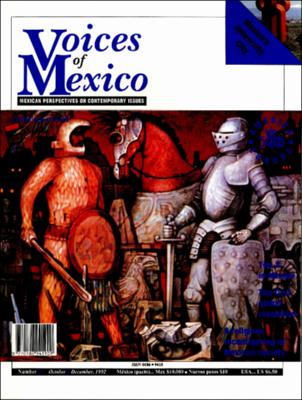Mostrar el registro sencillo del ítem
Voices of Mexico: Mexican Perspectives on Contemporary Issues
| dc.rights.license | http://ru.micisan.unam.mx/page/terminos | |
| dc.contributor.editor | Toro Gayol, Marybel | |
| dc.contributor.other | Velasco Montante, Astrid | |
| dc.date.accessioned | 2019-01-17T23:59:04Z | |
| dc.date.accessioned | 2022-02-17T00:15:36Z | |
| dc.date.available | 2019-01-17T23:59:04Z | |
| dc.date.available | 2022-02-17T00:15:36Z | |
| dc.date.issued | 1992 | |
| dc.identifier.issn | 0186-9418 | |
| dc.identifier.uri | https://ru.micisan.unam.mx/handle/123456789/21924 | |
| dc.format | application/pdf | |
| dc.format.extent | 104 pp. | |
| dc.language.iso | eng | |
| dc.publisher | Universidad Nacional Autónoma de México, Coordinación de Humanidades, Centro de Investigaciones sobre Estados Unidos de América | |
| dc.relation.isformatof | ||
| dc.relation.haspart | Our Voice / Margáin, Hugo B.; Your Voice / Gutiérrez Kirchner, Alfredo; Mundt, Rita M.;; The National Viceregal Museum of Tepozotlán / Ségota, Gordana; The Ships that Discovered America / Toro Gayol, Marybel; The X in Mexico; Christopher Columbus, Self-Taught Geographer / López Torres, Humberto; America Five Hundred Years Later / Zea, Leopoldo; An Overview of the History of Social Security in Mexico and the United States / Núñez García, Silvia; Unions and the Bracero Program: The Joint U.S.-Mexican Trade Union Committee / Driscoll de Alvarado, Bárbara; The History of Mexico City (part II) / Acosta, Miguel; Cárdenas, Graciela; Osnaya, Marcela; NAFTA Negociations Come to an End Mexico"s University City; A Religious Reconfiguring of Mexican Society /González M., José Luis; Second Ibero-American Summit Meeting / Toro Gayol, Marybel; From the Spirit to the Letter: The Second Ibero-American Summit / Paz, Alejandra de la; A Medley of Awards for Latin Americans / Villanueva, Raquel; The Earth Summit: Too Many Concessions / Montiel Ziegler, Elsie; USSR (1982): CIS (1992) / Margáin, Hugo B.; The First Global Revolution: Report From the Board of the Club of Rome; Thoughts on Sovereignity / Lajous, Adrián; Some Observatiosn on the Building of a New Internacional Order / Hua, Huang; Sergio Méndez Arceo: A Voice Beyond the Chorus / Montiel Ziegler, Elsie; Ignacio Bernal / Litvak King; Jaime The Day Of the Dead Luna Parra, GeorginaOur Voice / Margáin, Hugo B.; Your Voice / Gutiérrez Kirchner, Alfredo; Mundt, Rita M.;; The National Viceregal Museum of Tepozotlán / Ségota, Gordana; The Ships that Discovered America / Toro Gayol, Marybel; The X in Mexico; Christopher Columbus, Self-Taught Geographer / López Torres, Humberto; America Five Hundred Years Later / Zea, Leopoldo; An Overview of the History of Social Security in Mexico and the United States / Núñez García, Silvia; Unions and the Bracero Program: The Joint U.S.-Mexican Trade Union Committee / Driscoll de Alvarado, Bárbara; The History of Mexico City (part II) / Acosta, Miguel; Cárdenas, Graciela; Osnaya, Marcela; NAFTA Negociations Come to an End Mexico"s University City; A Religious Reconfiguring of Mexican Society /González M., José Luis; Second Ibero-American Summit Meeting / Toro Gayol, Marybel; From the Spirit to the Letter: The Second Ibero-American Summit / Paz, Alejandra de la; A Medley of Awards for Latin Americans / Villanueva, Raquel; The Earth Summit: Too Many Concessions / Montiel Ziegler, Elsie; USSR (1982): CIS (1992) / Margáin, Hugo B.; The First Global Revolution: Report From the Board of the Club of Rome; Thoughts on Sovereignity / Lajous, Adrián; Some Observatiosn on the Building of a New Internacional Order / Hua, Huang; Sergio Méndez Arceo: A Voice Beyond the Chorus / Montiel Ziegler, Elsie; Ignacio Bernal / Litvak King; Jaime The Day Of the Dead Luna Parra, Georgina | |
| dc.relation.requires | Adobe Acrobat | |
| dc.subject | HUMANIDADES Y CIENCIAS DE LA CONDUCTA | |
| dc.title | Voices of Mexico: Mexican Perspectives on Contemporary Issues | |
| dc.audience | Estudiantes | |
| dc.audience | Maestros | |
| dc.audience | Investigadores | |
| dc.audience | Otros públicos | |
| dc.audience | Medios de comunicación | |
| dc.contributor.assistanteditor | Montiel Ziegler, Elsie | |
| dc.contributor.assistanteditor | García Chávez, Alonso | |
| dc.contributor.businessmanager | Ocampo, Consuelo | |
| dc.contributor.copyeditorandtranslator | Cuicani | |
| dc.contributor.designer | Noriega, Ricardo | |
| dc.contributor.designer | Belmar, Marco Antonio | |
| dc.contributor.editorinchief | Margáin, Hugo B. | |
| dc.contributor.layout | Glypho, Taller de Gráfica | |
| dc.contributor.printer | Offset Setenta | |
| dc.contributor.salesandcirculationmanager | Creamer, Cynthia | |
| dc.coverage.placeofpublication | México | |
| dc.date.printcopyrighted | [ca. 1992] | |
| dc.description.extract | The problem of Mexican workers emigrating to the United States is rooted in history. After the 1848 border treaty known as the "Treaty of Guadalupe" put an end to the war with the United States, reside= on the Mexican side of the border continued to cross it as they had always done. In 1942, during the Second World War, a US delegation negotiated permission for Mexican workers to be employed on the other side of the border in replacement of Americans in uniform. The agreements protecting Mexican workers" rights expired in December of 1964, and since then, only a limited number of workers, varying from year to year, has been allowed to cross the border. In fact, a larger number do enter the US: including so-called undocumented workers or "alegas” as they are known in the United States, who exceed the established quota. This is one of the thorniest problems in relations between the two countries, and will be discussed by Mexican experts in this issue. Mexico and the United States have signed a number of agreements guaranteeing the human and labor rights of Mexican workers, whether illegal or not. Unfortunately, Mexican workers continue frequently to be mistreate exploited and killed as a result of the persecution to which they are subjected. This poisons bilateral relations at a time when, in the light of the approaching Free Trade Agreement, they should be an example of neighborly conduct. A smaller number of Mexican workers also emigrate to Canada, under an agreement signed by the Mexican and Canadian governments; this has not caused any conflict between our two countries. European workers from any of the European Economic Community countries are allowed to work freely in all of them. In the future, the same should apply to workers in North America. Workers" freedom to seek employment in any of the three NAFTA nations has not yet been dealt with in current FTA negotiations. This issue will discuss other aspects of the border, such as the rapidly expanding in-bond industries. It will also cover one of Mexico"s lesser known museums, the Spratling Museunt in Taxco. William Spratling, an American, came to Mexico and settled in Taxco. He devoted himself to making silverware with Mexican themes, set up a school for silversmiths, and awarded prizes for the best work. The museum was built in his honor. The Former Head of State of Nigeria and Chairman of the Africa Leadership Forum, Olesugun Obasanjo, expresses his views on the subject of a new world order. Always open to ideas from elsewhere, the UNAM welcomes the opportunity to publish the opinions of such distinguished personalities as Obasanjo. Since ideas know no bounds, we have included articles from prominent thinkers in Latin America, Europe and now Africa. An ecumenical sense of culture is one of the cornerstones of this university. The preservation of our endangered environment will be a recurrent theme in Voices. In this issue, Dr. José Sarukhán, the university"s rector, writes in defense of the Lacandon ecosystem, where progress is synonymous with ecological disaster. Porras Navarro highlights the contribution of native Mexicans to the new culture that grew out of the contact between Spaniards and natives in his article on the Painted books of pre-Hispanic and colonial Mexico. Hector Luisi, a distinguished Uruguayan, who helped write his country"s Constitution, discusses current inter-American affairs. Edmundo Flores comments on the effect of constitutional reforms on the agricultura) development of rural Mexico. Now the object of much attention and plan for development, the rural sector, home to almost half the population of Mexico, was subordinated to Mexico"s move towards industrialization in the 30"s. Poverty, ignorante and unsanitary conditions are widespread in the countryside. It is essential to raise the campesinos" standard of living, implement modern agriculture and agro-industry, and provide education and health services if Mexico is to become a society where differences between rich and poor are lesser than theyare today | |
| dc.discipline.clase | Multidisciplina | |
| dc.educationlevel | Medio superior | |
| dc.educationlevel | Superior | |
| dc.educationlevel | Posgrado | |
| dc.identifier.cisan | VOM_1992_0021 | |
| dc.identifier.conacyt | CONACYT | |
| dc.relation.issued | 21, October-December, 1992 | |
| dc.rights.accesslevel | openAccess | |
| dc.rights.creativecommons | http://creativecommons.org/licenses/by-nc-nd/4.0 | |
| dc.subject.conacyt | 4 | |
| dc.type.spa | other | |
| dc.view.accesslevel | DISPONIBLE |
Ficheros en el ítem
Este ítem aparece en la(s) siguiente(s) colección(ones)
-
Números completos [125]
MiCISAN, Repositorio Institucional
Hecho en México, todos los derechos reservados 2018. Esta página puede ser reproducida con fines no lucrativos, siempre y cuando no se mutile, se cite la fuente completa y su dirección electrónica. De otra forma, requiere permiso previo por escrito de la institución.
Sitio Web administrado por: Centro de Investigaciones sobre América del Norte • micisan@unam.mx








